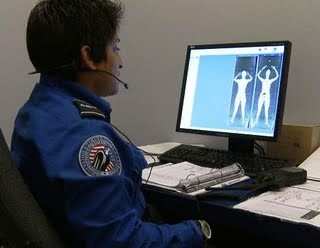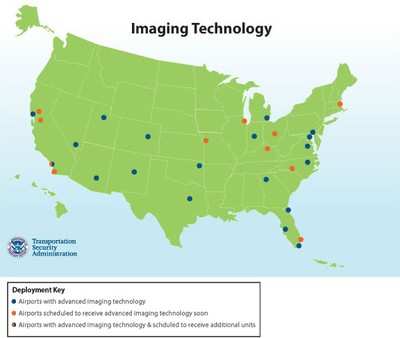Fri, Apr 16, 2010
65% Say They Are Willing To Cooperate In Full Body Electronic
Scans
Ninety-three percent of Americans said they are willing to
sacrifice some level of privacy to increase safety when traveling
by air, according to research conducted in January and February by
Unisys Corporation. Nearly two-thirds of Americans (65%) said they
are willing to cooperate with full electronic body scans at the
airport, and more than half (57%) would be willing to submit to
identity checks using biometric data such as iris scans or
fingerprints.

Nearly three quarters of Americans (72%) said they are willing
to provide personal data in advance of air travel to increase
security.
The findings, part of the latest bi-annual Unisys Security
Index, illustrate that recent events such as the attempted
Christmas Day airline bombing may have made security a priority for
air travelers. A clear majority of citizens in nearly every country
surveyed said they would be willing to forgo privacy to increase
air travel security. For example, 90% of citizens in the United
Kingdom and 70% of Australians said they would submit to electronic
body scans.
"An overwhelming majority of the global population is willing to
cooperate with enhanced travel security mandates, suggesting that
the public is willing to give up some privacy in return for safer
air travel," said Mark Cohn, vice president of enterprise security,
Unisys. "This suggests that the public supports technologies,
communications and personnel to enhance security at our nation's
airports, borders and ports."

The latest results of the Unisys Security Index also confirmed
that national security and identity theft rank as America's top
concerns, with nearly two-thirds (65%) "extremely" or "very"
concerned about U.S. national security and 64% seriously concerned
about identity theft.
"The finding that an overwhelming number of Americans are
willing to submit private information to enjoy safe air travel
provides strong evidence that the public's privacy fears may be in
decline," said Larry Ponemon, chairman and founder of the Ponemon
Institute, an independent research and consulting firm. "I find the
results of the Unisys Security Index as compelling evidence that
people throughout the world care deeply about their personal
safety, especially when traveling on a commercial airline."
More News
“While legendary World War II aircraft such as the Corsair and P-51 Mustang still were widely flown at the start of the Korean War in 1950, a new age of jets rapidly came to >[...]
Decision Altitude (DA) A specified altitude (mean sea level (MSL)) on an instrument approach procedure (ILS, GLS, vertically guided RNAV) at which the pilot must decide whether to >[...]
Aero Linx: National Aviation Safety Foundation (NASF) The National Aviation Safety Foundation is a support group whose objective is to enhance aviation safety through educational p>[...]
Also: Cal Poly Aviation Club, $$un Country, Arkansas Aviation Academy, Teamsters Local 2118 In response to two recent general aviation accidents that made national headlines, more >[...]
“The FAA is tasked with ensuring our skies are safe, and they do a great job at it, but there is something about the system that is holding up the medical process. Obviously,>[...]
 Aero-News: Quote of the Day (04.28.25)
Aero-News: Quote of the Day (04.28.25) ANN's Daily Aero-Term (04.28.25): Decision Altitude (DA)
ANN's Daily Aero-Term (04.28.25): Decision Altitude (DA) ANN's Daily Aero-Linx (04.28.25)
ANN's Daily Aero-Linx (04.28.25) Airborne-Flight Training 04.24.25: GA Refocused, Seminole/Epic, WestJet v TFWP
Airborne-Flight Training 04.24.25: GA Refocused, Seminole/Epic, WestJet v TFWP Aero-News: Quote of the Day (04.29.25)
Aero-News: Quote of the Day (04.29.25)




